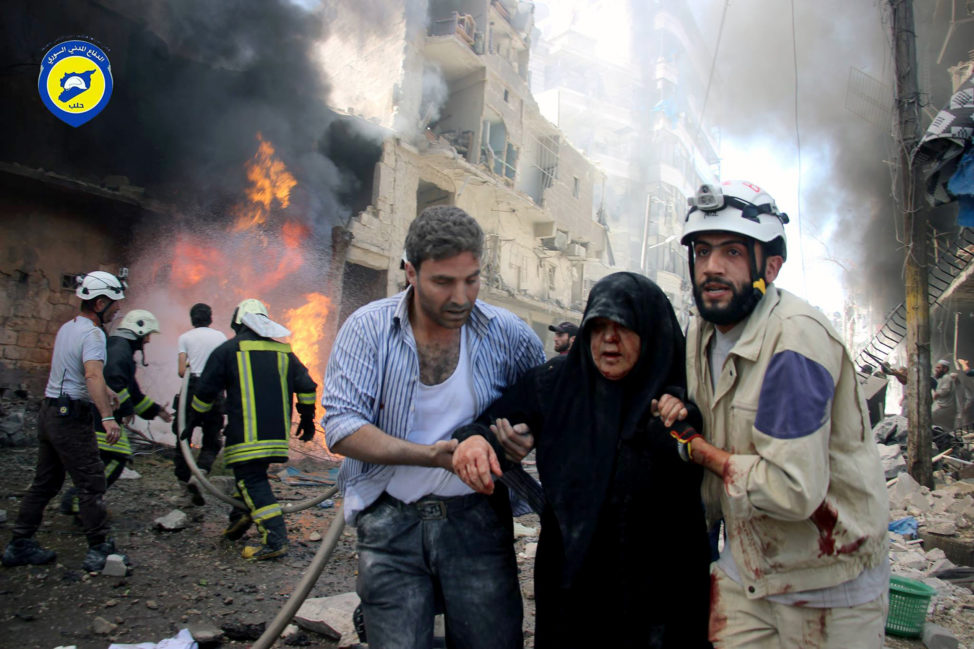By Barbara Slavin
As fighting continues for control of what was once Syria’s most populous city, Aleppo, the quiet, meticulous work of preparing dossiers for the eventual prosecution of Assad regime war crimes is about to bear fruit outside Syria
According to Stephen Rapp, the former US Ambassador-at-Large for War Crimes Issues, “there are several major” suspected perpetrators of such crimes who have been recently identified in Europe, where they fled among hundreds of thousands of Syrian refugees. These culprits can be charged now in Europe under laws that permit prosecution of those who tortured and killed citizens of European countries or dual nationals.
“Cases will begin this year,” Rapp said during a discussion at a Washington think tank last week,
Like the Nazis, the regime of Syrian President Bashar al-Assad meticulously documented its criminal response to Arab Spring protests that spread to Syria in 2011. Rapp, appearing before the Washington Institute for Near East Policy, said about one million pages of documents have been smuggled out of Syria. They show responsibility for barbaric repression goes to the very top of the government, including Assad and his brother Maher, the commander of Syria’s Republican Guard.
Several organizations, including the Commission for International Justice and Accountability, an independent body founded in 2012 with funding from the European Union, have been working on cases with the help of Rapp and other international legal specialists. With as many as five million Syrians now outside their country, there have been ample opportunities to bring out incriminating material and to find witnesses.
“You’d be amazed at some of the torturers that are now among the refugee population,” Rapp said.
In addition to the documents, investigators have come into possession of about 55,000 photos brought out of Syria in 2013 by a former military police investigator who goes by the pseudonym Caesar. The photos show the mangled, starved corpses of 11,000 detainees from the Damascus area alone, Rapp said. Of those killed, 760 people have been identified by their relatives, he said.
Rapp, who led the prosecution of war criminals in Rwanda and Sierra Leone before spending six years in the Obama administration, called the evidence against the Syrian regime “much more overwhelming” than what prosecutors possessed when went after those responsible for mass atrocities in Rwanda and Bosnia.

Residents trapped in rebel-controlled Aleppo are struggling to survive the crippling encirclement of their once thriving city. In this file photo taken on June 8, 2016, Syrian civil defense workers, right, helps an injured woman after warplanes attacked a street, in Aleppo, Syria. (Civil Defense Directorate in Liberated Province of Aleppo/AP)
Russia and China have vetoed efforts at the United Nations to refer these crimes to the International Criminal Court. But Rapp said “the day of accountability will come… There’s jurisdiction now to prosecute these crimes.”
Rapp would not identify cases ready for action for fear of prejudicing prosecutions and scaring suspects into fleeing again. “We don’t want them going to St. Petersburg (Russia),” he said.
But he noted that a civil suit has been filed in the United States by the family of Marie Colvin, an American war correspondent killed by a Syrian government rocket in the city of Homs in 2012. The suit names Assad, his brother Maher and Gen. Ali Mamlouk, the head of intelligence for the ruling Baath Party, as directly responsible for Colvin’s murder.
Theoretically, Rapp said, the U.S. Department of Justice could also prosecute the Assads for Colvin’s murder under U.S. law.
Russian commanders who are advising the Syrians and authorizing bombing of civilian targets could also be liable for prosecution for aiding and abetting war crimes. Rapp warned the Russian government not to use so-called “Grozny rules” against Aleppo, referring to the destruction of the capital of the restive Russian province of Chechnya during a brutal military campaign against Islamic rebels ordered by Russian leader Vladimir Putin in 1999.
Such wholesale bombardment is not only a war crime but simply creates more jihadists and terrorists, Rapp said.
Rapp doubts that Russia will turn out to be a productive partner for the United States in resolving the conflict, which has killed nearly half a million people since the Assad regime began brutally repressing protests in 2011.
“It is unthinkable that anyone would believe that the Putin government was playing a constructive role in Syria,” Rapp said. He also cast doubt on the notion that “we could succeed against ISIS by making common cause with Putin and Assad.”
It is hard to envision that real justice can come in Syria until the end of the war. Fighting currently appears to favor the Assad regime, which is backed by Iran as well as Russia. But prosecutions of some of the regime’s henchmen could have a deterrent effect as the Obama administration tries to negotiate cease-fires and humanitarian access to besieged areas.
There are 14 prosecution units that have successfully prosecuted Rwandan genocide and they are each working on Syrian cases today, Rapp said. “The day of justice is arriving and those commit these crimes will face consequences … evidence is being preserved [and witnesses] should come forward and assist … so we can deter… more atrocities.”
Barbara Slavin is Acting Director of the Future of Iran Initiative at the Atlantic Council in Washington. Follow her on Twitter @barbaraslavin1

